新版PEP小学英语六年级下册Unit3Where did you go-PartC第六课时
人教PEP版英语六年级下册Unit 3《Where did you go》教案

人教PEP版英语六年级下册Unit 3《Where did you go》教案一. 教材分析人教PEP版英语六年级下册Unit 3《Where did you go》主要讲述的是过去发生的事情。
本节课主要让学生掌握一般过去时态,能够用一般过去时态描述过去发生的事情。
通过本节课的学习,让学生能够听懂、会说、会读、会写一般过去时态的句子,培养学生运用英语进行交际的能力。
二. 学情分析六年级的学生已经掌握了基本的英语语法知识,对一般现在时态有一定的了解。
但是,对于一般过去时态的运用还比较陌生。
因此,在教学过程中,教师需要耐心引导学生,让学生充分理解和掌握一般过去时态的用法。
三. 教学目标1.知识目标:–学生能够掌握一般过去时态的构成和用法。
–学生能够听懂、会说、会读、会写一般过去时态的句子。
2.能力目标:–学生能够在适当的情境中运用一般过去时态进行交际。
3.情感目标:–学生能够对英语学习保持浓厚的兴趣,积极参与课堂活动。
四. 教学重难点1.教学重点:–一般过去时态的构成和用法。
–一般过去时态的句子表达。
2.教学难点:–一般过去时态的运用,尤其是在实际语境中的运用。
五. 教学方法1.任务型教学法:通过设置各种任务,让学生在完成任务的过程中运用所学知识。
2.情境教学法:创设各种真实的情境,让学生在情境中学习、运用英语。
3.交际法:鼓励学生积极参与课堂交际活动,提高学生的英语交际能力。
六. 教学准备1.教师准备:–教材、教案、课件。
–与本节课相关的故事书、图片、视频等教学资源。
2.学生准备:–预习本节课的内容。
–准备一本英语故事书,用于课堂上的阅读和分享。
七. 教学过程1.导入(5分钟)–教师与学生用英语进行自由对话,复习一下之前学过的一般现在时态。
–引导学生谈论一下他们平时喜欢做的事情,激发学生的兴趣。
2.呈现(10分钟)–教师展示一张图片,图片上有一个学生在画画。
–教师问学生:“Where did he go?”,学生回答:“He went to draw pictures.”–教师引导学生注意到句子中的“went”和“drew”,解释一般过去时态的构成和用法。
六年级英语下册Unit 3 Where did you go?Part B Let’s talk人教PEP版
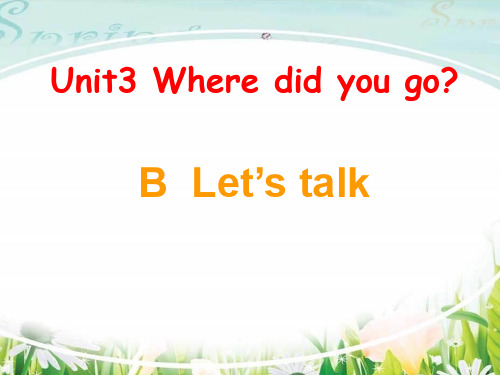
She went to Sanya , Hainan.
My family and I went to sanya.
2.How did she go there? She went there by plane.
they
went
It was warm and
beautiful in Sanya. So they_w_e_n_ t _s_w_i_m_m__i_n_g there and also t_o__o_k lots
of_p_i_c_t_u_r_e_.s
They had a good time in Sanya.
W:
Really?_2_________
C. What do you do there? D. Did you like it?
A:
Yes,
it
was
so
warm.E. What did you do there? F. My family and I went to S
S: Hainan is far from here._3____
Let’s try
Guessing
Wu Yifan and Amy meet Sarah at school.
Look and think
Where did Sarah go over the winter holiday?
She went to Hangzhou.
Let’s talk
Look and guess
A: Sure.
Try to retell
【教学课件】英语PEP版六年级下册《unit 3 Where did you go part B1》
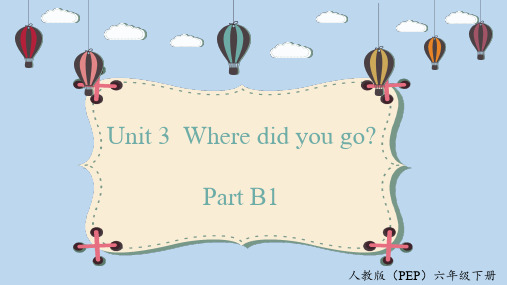
It was beautiful. I took lots of pictures, and I
also went swimming.
Let’s talk
Sounds great! Can I see your pictures sometime?
Sure.
Let’s talk Where? How?
Let’s discuss
Did you have fun last winter holiday? I did… Where did you go? I went to…
Let’s try
Let’t try Wu Binbin and Amy meet Sarah at school.
Listen and circle.
How did she go there? What did she do there? She went there by plane. She took lots of pictures and went swimming.
Explanation
询问对方过去怎么去某地…… 问句:How did you go (to) + 地点? 答语:We went there + 交通方式.
Thanks!
Day 3
Day 2 Day 4
Where did Amy go last winter holiday? How did she go there? What did she do there?
Let’s talk
Where did you go over the winter
holiday?
My family and I went to Sanya.
Unit3WheredidyougoPartALet'sLearn(教学设计)人教PEP版英语六年级

人教版《英语》(三年级起点)六年级下册Unit 3 Where did you go?A Let’s learn词汇课教学设计一、教学目标1.语言能力目标(1)能够听、说、读、写短语:rode a horse, rode a bike, went camping, went fishing, hurt my foot并能区分其原形及过去式。
(2)能听、说、认读句子: Where did you go last Saturday? I went to a forest park. What did you do there? I rode a bike. 并在情境中理解与正确运用。
(3)掌握核心句型:Where did you go …?和What did you do?的语义以及语用情景,并能根据内容进行第三人称的转换。
2.学习能力目标通过单词拼读规则,学习新知,通过篇章培养学生自主学习能力。
能让孩子们在情境中理解并在真实场景中正确运用过去式。
3.思维品质目标通过关键词holiday,回想更多的节日,通过动词短语去回想更多的相关词组,培养学生的思维发散能力。
4.文化意识目标能够通过主题了解更多的节日及相关知识,培养学生的文化素养,倡导积极向上的生活态度。
二、教学重点1. 5个动词短语的过去式;2. 掌握核心句型:Where did you go …?和What did you do?的语义以及语用情景。
三、教学难点能够在情景中恰当运用由where和what引导的一般过去时特殊疑问句。
四、教学思路本课是对第二单元话题Last Weekend知识语言的深度拓展,从语言能力上运用过去式进行更广泛深入的表达。
本堂课始终围绕主线holiday开始各种活动,课堂伊始,通过歌曲引出主题holiday,进行有关于holiday去了哪里,做了什么,假日怎么样等拓展问答后,带入新知,通过听说、观察图片等方式,导入新词;通过发散,带出更多的相关短语;利用课文的听写练习复习了动词短语;最后小组合作活动让孩子们通过讨论的方式表达自己的假日活动,在真实的交流中逐步达成应用本课语言的目标。
Unit3+where+did+you+go+知识点梳理-2024学年人教PEP版英语六年级下册
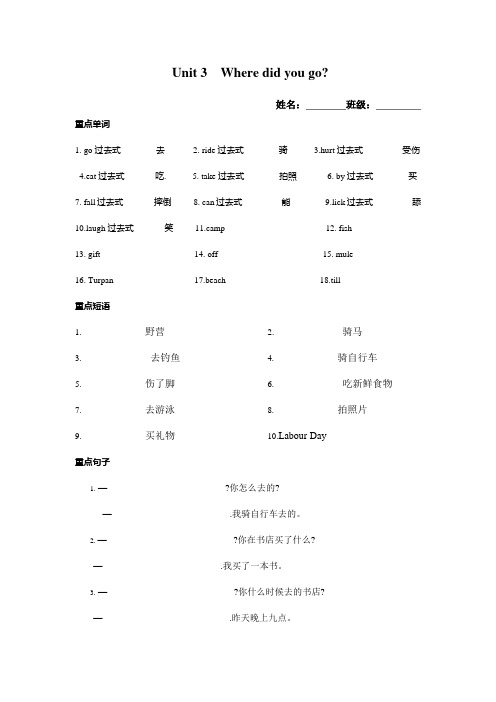
Unit 3Where did you go?姓名:________班级:_________重点单词1. go过去式_______ 去2. ride过去式_______ 骑3.hurt过去式________ 受伤4.eat过去式_______吃.5. take过去式_______ 拍照6. by过去式_______ 买7. fall过去式_______摔倒8. can过去式_______ 能9.lick过去式_______ 舔ugh过去式_______笑11.camp_________ 12. fish___________13. gift _________ 14. off_________ 15. mule_________16. Turpan _________ 17.beach _________ 18.till _________重点短语1. ______________野营2. ______________骑马3.______________去钓鱼4. ______________骑自行车5. ______________伤了脚6. ______________吃新鲜食物7. ______________去游泳8. ______________拍照片9. ______________买礼物bour Day______________重点句子1.—___________________________?你怎么去的?—___________________________.我骑自行车去的。
2. —_____________________________?你在书店买了什么?—___________________________.我买了一本书。
3.—_____________________________?你什么时候去的书店?—_____________________________.昨天晚上九点。
新版PEP小学六年级英语下册Unit-3-Where-did-you-go教案

新版PEP小学六年级英语下册Unit-3-Where-did-you-go教案Unit 3 Where did you go ?第一课时教学步骤:Step 1. Warm-up1.利用图片和学生一起唱歌谣,要求一边唱一边做动作。
如:What can you do ? I can sing.What can you do ? I can dance.What can you do ? I can climb a mountain.What can you do ? I can take a pictures.What can you do ? I can speak Chinese.2.用多媒体课件展示自己外出旅游的照片,并做相关介绍。
如:Last summer holiday, I went to hainan. It was sobeautiful. I went swimming in the sea. And picked someseashells on the beach.Step 2. PresentationLet’s talk(从呈现完整对话到处理局部语言)1.整体感知对话并回答问题。
(1)通过提问要求学生猜测:Did yougo to John’s home ? What happened toJohn? What did they talk about later?请学生带着问题观看动画或阅读文本,了解John脚受伤的原因:He fell of hisbike,利用图片帮助学生理解并教授fell.同时,通过观看动画或阅读文本获得对话的主旨:They talked about John’sLabout Day holiday.(2)结合日历,让学生理解Labour Day holiday概念。
提问:Look at thecalendar. What date is it ? It’s May 1st . On May 1st ,we usually have three days off. We call it Labour Day holiday.(3)继续提问学生:Where did John go on his Labour Day holiday ? What did hedo there ? 要求学生带着问题观看动画或阅读文本获取信息,并用思维导图板书对话关键信息。
Unit 3 Where did you go?(说课稿)人教PEP版英语六年级下册

Unit 3 Where did you go? (说课稿)一、教材分析本节课是人教版PEP小学英语六年级下册的第三个单元,主要内容是让学生学习谈论他们去过的地方,使用一般过去时的肯定、否定和疑问句,以及对下雨天进行简单的描述。
本节课的教学时间为两课时。
1. 教材情境小吉和小芳是好朋友,在周末和假期他们经常一起出去玩。
本节课,小吉询问小芳去过哪些地方,并回答了小芳的问题。
他们还描述了他们在雨天去旅行的经历。
2. 学习目标•了解一般过去时的用法及其肯定、否定和疑问句形式;•学会使用一般过去时谈论自己去过的地方;•能够简单地描述下雨天旅行的情况;•增强学生的口语交流能力和听说能力。
3. 重点和难点•重点:学会使用一般过去时的肯定、否定和疑问句形式;•难点:能够用简单的语言描述下雨天旅行的情况。
4. 教学方法本课时采用综合教学法,既有听说读写和交际教学相结合的方式,注重学生参与,通过小组讨论和互动交流,培养学生口语表达能力。
二、教学过程1. Warming up教师先用图片或实际物品引出话题,如海滨、动物园等,鼓励学生谈论自己去过哪些地方或一个人最想去哪个地方。
2. Presentation教师介绍一般过去时的用法,例如:用于谈论已经结束的过去的事件、经历和状态,例如昨天、周末、去年、小时候等。
学生跟读教师所说的句子,并对读音和句子的语法结构进行模仿和理解。
3. Practice教师利用图片或漫画引出勾起学生的兴趣,让学生看到两位好朋友的对话:小吉问小芳去过哪些地方,小芳回答并询问小吉同样的问题。
然后学生小组内讨论,并回答以下问题:•Where did you go?•Who did you go with?•What did you do there?•Did you have a good time?教师鼓励学生使用一般过去时来回答问题,并给出肯定、否定和疑问句的不同形式。
4. Production教师用图片或实际物品引出雨天旅游的话题,并让学生小组内讨论,回答以下问题:•Did you go to any place when it rained?•What did you do there?•How was the weather?然后,教师请学生表述自己的经历,简单描述他们在雨天去旅游的经历,培养学生口语表达能力。
六年级英语下册专题讲解:Unit 3 Where did you go?(一般过去时态)人教PEP版

Unit3Where did you go?1. 能够听、说、读、写rode a horse ,rode a bike ,went camping ,hurt my foot ,went fishing等词组。
2. 能够运用核心句型Where did you go …? What did you do …? 及词组谈论假期的活动。
3. 能够掌握一般过去时的动词变化规则。
重点:1. 词汇:rode a horse ,rode a bike ,went camping ,hurt my foot ,went fishing。
2. 句型:Where did you go …? What did you do …?难点:1. 能够运用本课的核心句型Where did you go …? What did you do …? 进行简单的交流。
2. 掌握一般过去时的动词变化规则。
Step1Warm-up1. Let’s sing ;唱【one little finger】通过英语律动,活跃课堂气氛。
2. Review; 复习一些动词的过去式。
3. Step2Presentation1.2.T: Now let’s start to learn some new words of the past tense of verbs.并根据周一张鹏和约翰去上学时的对话引出句型:where did you go?what did you do?(1) 教师出示词组go camping,并提问What did you do? 然后出现go camping 的过去式went camping,学生听音跟读,并用I went camping. 进行回答。
(2) 教师出示词组ride a bike 及其意思,并提问What did you do? 然后出现ride a bike 的过去式rode a bike,学生听音跟读,并用I rode a bike. 进行回答。
pep小学六年级英语下Unit 3 Where did you go

go fishing
go camping
野营
去钓鱼
What did you do last weekend? I ...
rode a horse
骑马
rode a bike
骑自行车
went fishing
went camping
野营 (尤指在假日)
去钓鱼
Where did you go last weekend? 你上周末去了哪里?
Where
How
How did you go there?
When
What
What did you do there?
Who
Who did you go with?
When did you go there?
I went to New York over my winter holiday.
5. picture = photo 照片
6. Sounds great!
完整句型:It sounds great!
1). That news sounds great! 听起来 2). The fish tastes yummy.尝起来 3). You look tired.看起来 4). Your room smells bad. 闻起来 5). My coat feels very warm. 感觉
ate some bad fruit fell off my bike and hurt my foot had a cold
saw a good film read a funny book listened to music
As the saying goes, “Bad luck often brings good luck.”
新版人教版(PEP)六年级英语下册unit3-where-did-you-go
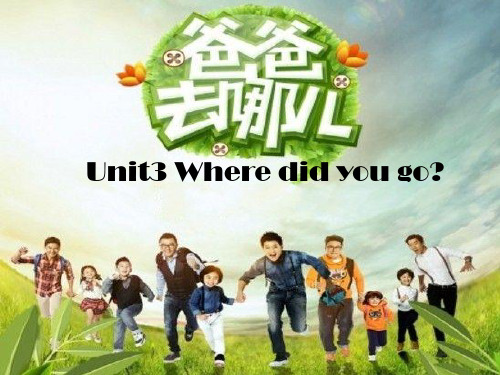
yesterday
Catch the plane 找飞机,看谁快
last Monday
the day before yesterday last week
一般过去时态
含义
表示过去某个时间里发生的动作或状态。
动词过去式
规则变化
不规则变化
动词过去式
1. 直接加ed eg. watched; washed; cleaned; played; cooked; wanted 2. 以不发音的e结尾,在词尾加d eg. liked, used, lived 3.以辅音加y结尾,去y变i加ed eg. stuied, worried 4. 以元音加辅音结尾的重读闭音节, 双写加ed eg. stopped 5.不规则变化 rg. saw, drank, read, did, was...
delicious food.今天是晴朗的一天。在早上,我们骑了三人自 行车。马克斯坐在自行车前面的(车)筐里。那很有趣! 我们拍了美丽乡村的照片。我们买了一些礼物,并且吃了 一些美味的食物。
In the afternoon, Mum ate some bad fruit and didn't feel well. So we stayed in the hotel. Dad and I wanted to make her happy. We dressed up and made a funny play. Robin played the part of a dog. He was so cute. Max liked him so much. He jumped on him and licked him.Of course,
人教PEP版英语六年级下册Unit3《Wheredidyougo》(歌曲)教学设计

人教PEP版英语六年级下册Unit 3《Where did you go》(歌曲)教学设计一. 教材分析《Where did you go》是人教PEP版英语六年级下册Unit 3的内容,这首歌谣以轻松愉快的旋律和简单易懂的歌词,让学生在唱歌的过程中学习一般过去时态和描述过去发生的事情。
通过这首歌谣,学生可以巩固和运用已学过的词汇和句型,提高听说能力和语言运用能力。
二. 学情分析六年级的学生已经掌握了基本的英语语法和词汇,对于一般过去时态有一定的了解。
他们在学习过程中乐于参与歌唱活动,通过音乐来提高学习兴趣和积极性。
然而,部分学生可能在发音和听力方面存在困难,需要教师的耐心指导和反复练习。
三. 教学目标1.让学生通过唱歌活动,掌握一般过去时态的运用。
2.学生能够听懂并唱出《Where did you go》这首歌曲,理解歌词的含义。
3.学生能够在日常生活中运用所学的词汇和句型,描述过去发生的事情。
4.提高学生的听说能力和团队协作能力。
四. 教学重难点1.教学重点:让学生掌握一般过去时态的运用,能够听懂并唱出《Where did you go》这首歌曲。
2.教学难点:一般过去时态的运用,以及部分生僻词汇的准确发音。
五. 教学方法1.情境教学法:通过设置情境,让学生在实际环境中运用所学知识。
2.任务型教学法:通过完成唱歌任务,激发学生的学习兴趣和积极性。
3.互动式教学法:引导学生相互交流、合作,提高听说能力和团队协作能力。
六. 教学准备1.准备多媒体教学设备,如投影仪、音响等。
2.准备《Where did you go》的课件和教学素材。
3.准备歌词卡片和动作指导卡片。
4.准备录音机或音响设备,以便播放歌曲。
七. 教学过程1.导入(5分钟)利用课件展示一幅旅行图片,引导学生谈论过去的旅行经历。
教师提问:“Where did you go?”,学生回答:“I went to…”。
通过这种方式激发学生的学习兴趣,引入本节课的主题。
小学英语人教版(PEP)六年级下册Unit,3,Where,did,you,go,Part,A,第二

小学英语人教版(PEP)六年级下册
Unit,3,Where,did,you,go,Part,A,第二
场景:小明和小红在学校的图书馆门口碰到了,他们开始交谈。
小明:Hi, Xiaohong! Where did you go on the weekend?
小红:Hi, Xiaoming! I went to the zoo with my family. It was so much fun! 小明:That sounds great! Did you see any lions there?
小红:Yes, I did! We also saw elephants, giraffes, and a lot of other animals. 小明:Wow! I would love to go to the zoo someday. How did you go there? 小红:We went there by car. It was a long drive, but it was worth it.
小明:I bet it was! I hope I can go to the zoo with my family too.
小红:You should definitely go! It's a wonderful place to learn about different animals.
小明:Thanks for sharing, Xiaohong. Maybe I will visit the zoo next weekend. 小红:You're welcome, Xiaoming. I'm sure you'll have a great time there.。
PEP人教版小学英语六年级下册Unit 3 Where did you go(第一课时)
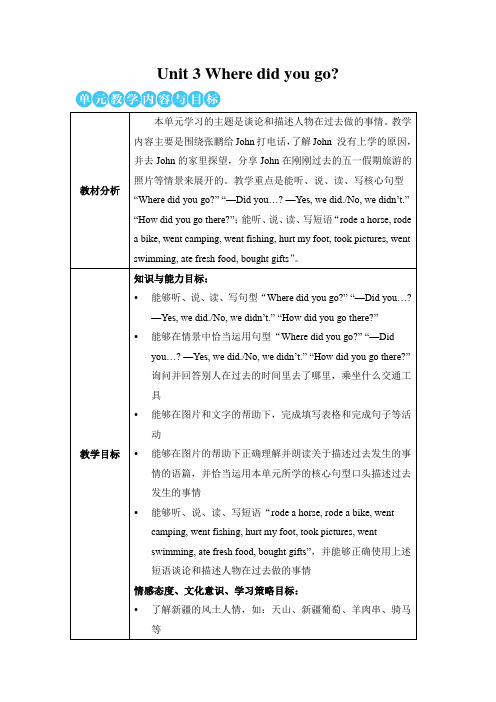
Unit 3 Where did you go?•建立事物都有两面的观念,好事坏事没有绝对,可以相互转换,因此要以乐观的心态面对生活•能够通过看图捕捉关键信息,并根据相关提示完成听前预测课时安排第一课时:Part A Let’s try & Let’s ta lk第二课时:Part A Let’s learn & Listen, answer and write第三课时:Part B Let’s try & Let’s talk第四课时:Part B Let’s learn & Look and say第五课时:Part B Read and write第六课时:Part B Let’s check & Let’s wrap it upThe first period(第一课时)Part A Let’s try & Let’s talk▶教学内容与目标课时教学内容课时教学目标Let’s try•能够读懂题目要求,学会听前预测听力的重点内容。
•能够运用基本听力技巧完成本部分的听力任务。
•能够通过听力活动获得Let’s talk板块的相关信息,为下面的对话学习做准备。
Let’s talk•能够在图片和教师的帮助下理解对话大意,并回答对话下面的问题。
•能够在语境中理解生词或短语“fell off, Labour Day, mule,Turpan, could, till”的意思,并能正确发音。
•能够通过对话了解新疆的风土人情。
•能够用正确的语音、语调及意群朗读对话,并能进行角色表演。
•能够在情景中恰当运用由where和what引导的一般过去时的特殊疑问句。
▶教学重点能够在情景中运用句型“—Where did you go over your holiday? —I went to…” “—What did you do? —I…”谈论去过的地方和所做过的事情。
新PEP小学英语六年级下册Unit3-Where-did-you-go-A-Let's-learn-
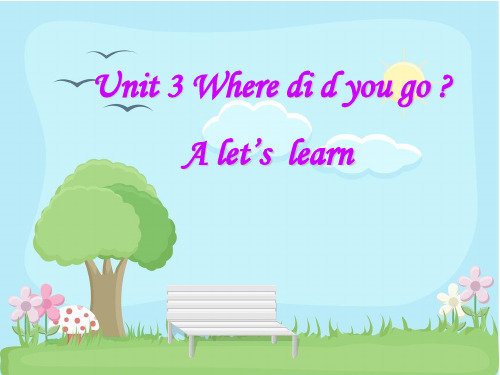
/went/
:I went to a forest park.
go-----went
: What did you do there?
go-I-wweenntt ffiisshhiinngg.
went camping go camping
A:What did he/she do yesterday ? B:He/She _____.
Unit 3 Where di d you go ? A let’s learn
read a book
slept stayed drank
was talked watched
Pair work
A: What did you do the day before yesterday/yesterday/last weekend/?
: What happened then?
hurt-----hurt
Oh, I hurt my foot.
He rode a bike ,and he hurt his foot.
hurt his foot
hurt my foot hurt my foot
hurt my head hurthumryt hmayndarm
w
f
.
w
c.
r ab
.
h
my f .
r
ah
.
拼拼写写:
/ rәud ә baik /
/ went `fi⌠iŋ /
/ went tu: ә pa:k /
/ went cæ mpiŋ /
/ hә:t mai fut /
拼拼写写:
/ rәud ә baik /
/ went `fi⌠iŋ /
- 1、下载文档前请自行甄别文档内容的完整性,平台不提供额外的编辑、内容补充、找答案等附加服务。
- 2、"仅部分预览"的文档,不可在线预览部分如存在完整性等问题,可反馈申请退款(可完整预览的文档不适用该条件!)。
- 3、如文档侵犯您的权益,请联系客服反馈,我们会尽快为您处理(人工客服工作时间:9:00-18:30)。
dressed up
made a funny play stayed in the hotel
Today was a bad but good day for me. First, it was a bad day,
Mum ate some bad fruit and didn’t feel well.
laugh
(笑)
hurt hurt
hav e buy eat
had
bought
ate
Байду номын сангаасgo
went
shopping presents
?
last weekend last night
?
ice-cream
an English class
?
yesterday
last Monday
this morning
It was good.
So, it was bad but good.
I hurt my foot. Then, I ate yummy food.
It was bad.
It was good.
So, it was bad but good.
微博
Discuss(4人小组讨论): Where were they? What happened?
3、Wu Yifan’s family bought some gifts and ate some delicious food. ( √ )
Task 3
再次小声读全文,用波浪线划出所发生的事清。
What did Wu Yifan’ family do? in the morning:
rode a bike took pictures
Let’s check
Let’s wrap it up
Look at the pictures. Choose words to fill in the blanks.
Story time
Homework
1、Read the diary.
(读一读这篇日记)
2、Say something about your bad but good day with your friends, then write it down.
a PE class
?
my leg
my arm
last year
last month
?
boug ht
some apples
yesterday
I bought some apples for my mother yesterday.
I bought … for … yesterday.
I took pictures of …
…
Task 1
快速阅读,捕捉关键信息,给图片排序。
2
3
听全文,标号三图
1
限时1分钟
For Wu Yifan, was it a good day or bad day?
Task 2
翻书听第一段,判断句子对错。
A
B
1、 Wu Yifan’s family rode a bike in the evening. (× ) 2、Wu Yifan’s family took pictures of the beautiful city. (× )
What happened to Wu Yifan’s family? in the morning:
rode a bike took pictures bought some gifts
ate some delicious food
in the afternoon:
Mum ate some bad fruit and didn’t feel well.
But what did we do then?
We We We We We
rode a bike. took pictures. bought some gifts. ate some delicious food. made a funny play.
So it was also a good day.
bought some gifts
ate some delicious food
in the afternoon:
Mum ate some bad fruit and didn’t feel well.
stayed in the hotel dressed up
made a funny play
Was a good day or bad day?a good It it was a bad day but also Fridayday. , April 23rd
I
had a party at school
四人小组合作, 拼出一句好消息
yesterday.
限时15秒
I
lost money
at school
yesterday.
四人小组合作, 拼出剩下3句消 息,读读看看。
I had a cold.
Then, I slept all day.
It was bad.
clean
cleane d stayed played watche d
stay play
watc h
hurt hurt sit sat
hav e buy
had
bought
ride
go fall
rode
eat
(舔)
ate
licked laughe d
went lick
jum p
jumped
fell
(和你的朋友说一说你糟糕但又美好的一天)
